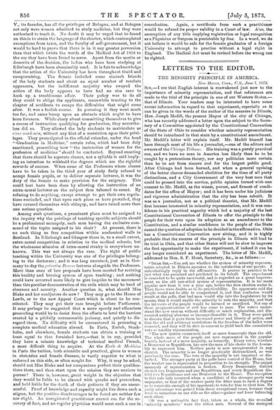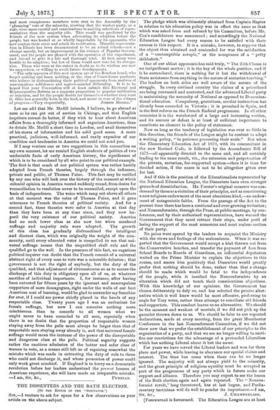LETTERS TO THE EDITOR.
THE MINORITY PRINCIPLE IN AMERICA.
Neu! Bares, Conn., U.S., June 7, 1873. SIR,—I see that English interest is reawakened just now to the importance of minority representation, and that references are made to the trial of the principle in one of our Western States.— that of Illinois. Your readers may be interested to have some recent information in regard to that experiment, especially as it can be given in the words of the author of the measure in Illinois, Hon. Joseph Medill, the present Mayor of the city of Chicago, who has recently addressed a letter upon the subject to the Secre- tary of a Committee appointed by the Constitutional Convention of the State of Ohio to consider whether minority representation should be introduced in that state by a constitutional amendment. Mr. Medill's letter will explain itself. Mr. Medill himself has been through most of his life a journalist,—one of the editors and owners of the Chicago Tribune. His training was a purely practical one, and we have no man in America less likely than he to be caught by a pretentious theory, nor any politician more certain than he to act from sincere zeal for the largest public good. After Chicago had been burned, and when a general uprising of the better classes demanded abolition for the time of all party distinctions, and a City Government of the very best men that could be pressed into the service, public opinion turned with one consent to Mr. Medill, as the wisest, purest, and firmest of candi- dates for the office of Mayor ; and it has been under his judicious and vigorous administration that the city has been rebuilt. It was as a journalist, not as a political theorist, that Mr. Medill first became interested in minority representation, and it was con- fidence in his practical sagacity which led a majority of the last Constitutional Convention of Illinois to offer the principle to the people for their vote upon its adoption as an amendment to the Constitution, and a similar confidence in the people of the State caused the question of adoption to be decided in the affirmative. Ohio has a Constitutional Convention now sitting, and it is highly probable that the success of the principle in Illinois will lead to its trial in Ohio, and that other States will not be slow to improve the first opportunity to make the experiment, if indeed it can be any longer considered an experiment. The letter of Mr. Medill, addressed to Hon. S. F. Hunt, Secretary, &c., is as follows :- "DEAR SIR,—You ask me whether the system of minority represen- tation adopted in Illinois operates to the satisfaction of our people. I unhesitatingly reply in the affirmative. It proves in practice to be just what was promised and predicted in its behalf. The experiment is conceded to be quite successful, and is regarded as a groat improve- ment on the old one-sided system of representation. It is far more popular now than it was a year ago, before the first election under it. Then there were doubts as to its practicability. Its opponents said the people would not be able to comprehend it, and that confusion would result at the polls, that bad men would slip into the Legislature by its means, that it would enable the minority to rule the majority, and that the interests of the people would be harmed or sacrificed. Not one of these prognostications of evil has come to pass. The voters under- stand the new system without difficulty or much explanation, and dis- covered nothing abstruse or incomprehensible in it. They were quick to discern that it gave them increased power and liberty of action, and that the old and arbitrary restrictions in the freedom of the ballot were removed, and they will be slow to consent to yield back the cumulative vote or totality representation.
"The new system commends itself as more democratic than the old. The whole mass of the people are now represented in the popular branch, instead of a mere majority, as formerly. Every voter, whether a Democrat or Republican, has now tho man of his choice in the Assem- bly to represent him. Neither party is now unrepresented in any district. The minority is no longer practically disfranchised, as was previously the case. The vote of the majority is not impaired or dis- turbed. The stronger party at the polls have control of the House, but the weaker one is represented in proportion to its strength. The unjust monopoly of representation is broken. Every Democratic district elected two Democrats and one Republican, and every Republican dis- trict two Republicans and one Democrat to the House. The exception to this rule only occurred when a candidate of the stronger party was unpopular, or that of the weaker party the fitter man to such a degree as to constrain enough of his opponents to vote for him to elect him. No party advantage was gained from these exceptional cases, because they were as numerous on one side as the other—gainer and loser balancing each other.
"It was a noticeable fact that, taken as a whole, the so-called minority members' were the ablest men. Several of the strongest and most conspicuous members were sent to the Assembly by the plumping ' vote of the minority, showing that the weaker party, as a rule, were more careful and conscientious in making selections of repre- tsentatives than the majority side. This result was predicted by the friends of the new system when advocating its adoption before the people, but was hooted at as wholly improbable by its opponents, who mow confess their error and admit its verification. Minority representa- tion in Illinois has been demonstrated to be an actual reform—not a change merely, but an improvement in the science of Popular Govern- -merit, and the people are pleased with the operation of the experiment, .and intend to give it a fair and thorough trial. At first, many were hostile to its adoption ; but few of them would now vote for its abroga- tion. Those who were at the outset in doubt as to its wisdom are now its supporters, or willing to await future developments.
-" The only opposers of this new system are of the Bourbon breed, who forget nothing and learn nothing, or the clan of Court-house partisans who believe in disfranchising their political opponents from motives of -unscrupulous selfishness and narrow-minded illiberality. It is to be "hoped that your Convention will at least submit this Electoral and Representative Reform as a separate proposition to popular ratification ..or rejection, and let the people decide for themselves whether they want It. Ohio has generally been in the lead, and never in rear of the column cof progress.—Very respectfully, JOSEPH NEDILL."
Let me add that Mr. Medill intends, I believe, to go abroad as :soon as he can get out of service in Chicago, and that English inquirers cannot do better, if they wish to hear about American affairs from a thoroughly informed and sagacious American, than to detain Mr. Medill a short time in London, and avail themselves -of his stores of information and his solid good sense. A more practical, judicious, well-informed, and ready expositor of our .condition and tendencies in America we could not send you.
If I may venture one or two suggestions in this connection on my own account, let me remind English students of politics of two -undeniable facts of early American history, the significance of which is to be considered by all who point to our political example. The first is that much of our political system was rather hastily -adopted from French theories, largely through the influence, -private and public, of Thomas Paine. This fact may be verified by any one who will look over the history of the moment at which .colonial opinion in America veered suddenly round, from desire for reconciliation to resolution never to be reconciled, except upon the basis of independence. The voice which rang out above all others -at that moment was the voice of Thomas Paine, and it gave utterance to French theories of political society. And for a second fact, these theories were safer in America at that day than they have been at any time since, and they now im- peril the very existence of our political society. America had no such lower class as she now has when manhood suffrage and majority rule were adopted. The growth of this class has gradually disfranchised the intelligent .and discreet class, which was originally the weight of the com- munity, until every educated voter is compelled to see that uni- versal suffrage means that the unqualified shall rule and the qualified go to the wall. In the presence of this fact, no sagacious political inquirer can doubt that the French conceit of a universal abstract right of every man to vote was a miserable delusion ; that government is not the right of anybody, but the duty of the qualified, and that adjustment of circumstances so as to secure the discharge of this duty is obligatory upon all of us, at whatever sacrifice of individual importance. I, for instance, after having -been outvoted for fifteen years by the ignorant and unscrupulous supporters of mere demagogues, right under the walls of our best American seat of learning, would be glad to surrender my franchise for ever, if I could see power chiefly placed in the hands of any respectable class. Twenty years ago I was an enthusiast for -female suffrage, but now I can conceive nothing more -mischievous than to concede to all women what we ought never to have conceded to all men, especially when there is no doubt that the proportion of respectable women staying away from the polls must always be larger than that of .respectable men staying away already is, and that universal female suffrage would mean the increase of the power of the disreputable and dangerous class at the polls. Political sagacity suggests _rather the cautious admission of the better and safer class of women to vote, as a means still left us of repairing somewhat the mistake which was made in entrusting the duty of rule to those who could not discharge it, and whose possession of power could only work great mischief. If England is to hurry on a democratic
.revolution before her leaders understand the present lessons of American experience, she will have made an irreparable mistake.



































 Previous page
Previous page